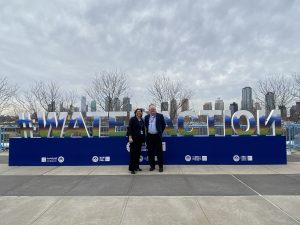
Represented by the Global Water Security Center, The University of Alabama was one of only 440 organizations including only 80 universities worldwide awarded special accreditation to participate in the 2023 United Nations Water Conference.
Mike Gremillion, GWSC director and interim executive director of the Alabama Water Institute, and Dr. Kate Brauman, GWSC associate director for analysis and communications, attended the conference in March at the U.N. headquarters in New York City.
“Participating in this conference was an important learning experience for the GWSC and – more importantly – allowed us to make connections,” Brauman said. “We hope those connections will help us translate and communicate the right kinds of water security data to the right people so that they can make informed decisions on how to respond to global water events.”
The GWSC was a supporting organizer for the side event “Water We Waiting For?”. The event sought to open up the UN 2023 Water Conference to more of the world by bringing together water consortia from hubs in New York, Brazil, Kenya and the Netherlands to collect more actionable targets that could help shape the Water Action Agenda on Water for Development.
GWSC also was a supporting organizer for “Water Innovations for Sustainable Development: A Get-up, Stand-up Session” and “Addressing Water Scarcity to Achieve Climate Resilience and Human Health,” where Brauman was featured as a panelist.
“Part of what’s so exciting about water is that it’s critical to many different things,” Brauman said. “Whether you’re interested in drinking water, climate change, equity, injustice or freshwater dolphins, water is part of all of that.”
A key element – and persistent challenge – of progress toward improving global water security is understanding the demographics of people affected by water. Biophysical factors often determine who has access to water, and information about distributional equity and underserved groups is often lacking.
And it’s important to recognize the truly global impact of water security issues. Water security is an issue worldwide; even in the U.S., many people don’t have access to clean water. Brauman said in the face of such a big, global issue, it’s important to remember that individuals can contribute.
“There’s absolutely something for everyone to do,” she said. “Some of that is considering personal water management at home all the way up to who we are voting for and what we are demanding our politicians do.”
Brauman said it’s critical that people are engaged in water issues and make it clear to their elected officials that water is a priority. Though more work is needed to create a water-secure world, the team at the Global Water Security and hundreds of others at the U.N. conference demonstrated that they are willing, able and excited to do the work. “It’s an exciting field to be in,” Brauman said. “There is much contribution to be made.”